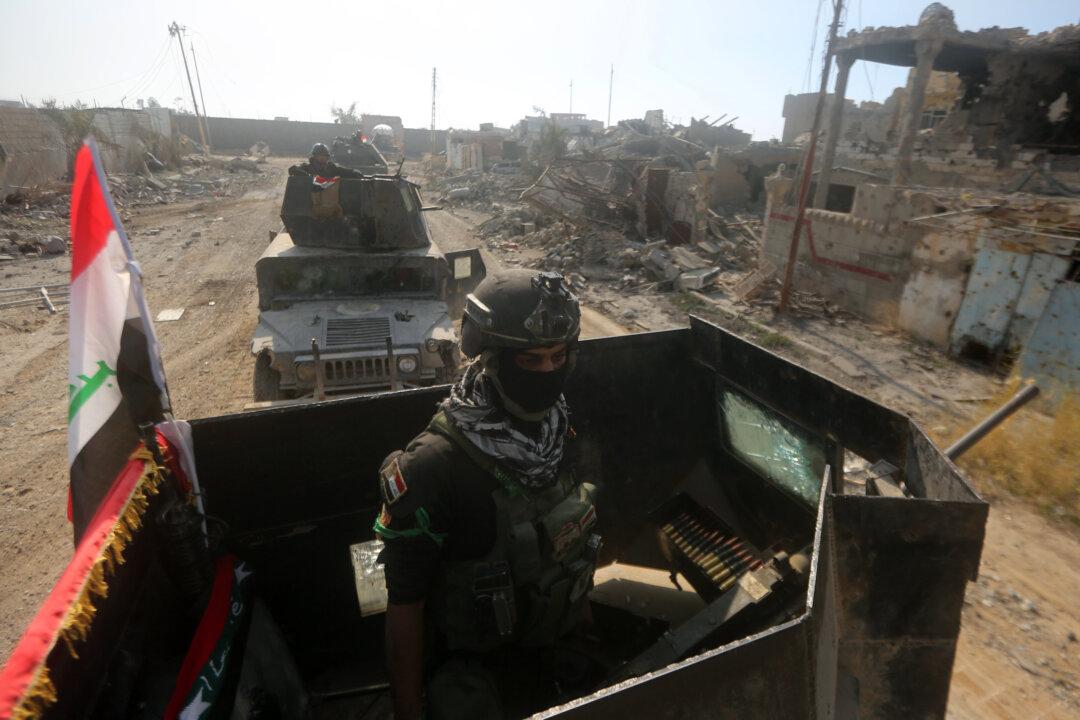BAGHDAD—The advance of Iraqi forces into the heart of Ramadi, a restive city that fell to the Islamic State (ISIS) earlier this year, in some ways vindicated the U.S.-led coalition’s strategy for rolling back the extremists—but victory has come at a high cost, and the same tactics might not work elsewhere.
The battle for Ramadi was waged by the Iraqi military—rather than Shiite or Kurdish militias—with elite counterterrorism units advancing under the cover of coalition airstrikes and raising the Iraqi national flag over the main government complex in the provincial capital on Monday.
Pockets of resistance remain, but the majority of Ramadi is under government control for the first time since May, when ISIS militants punched their way into the city with a series of massive suicide car bombs, scattering and humiliating Iraq’s beleaguered security forces.
Brig. Gen. Ahmed al-Belawi said “heavy and concentrated airstrikes” by the U.S.-led coalition killed ISIS fighters, destroyed their vehicles and blew up suicide car bombs before they could be deployed, allowing his forces to advance into the city.
“I think this fight shows the Iraqis are ready to fight and these calls for U.S. ground troops are not the best strategy moving forward,” said Ahmed Ali, a senior fellow at the Institute of Regional and International Studies at the American University of Iraq.
“What we saw in terms of the combination of airstrikes and intelligence support and then forces on the ground, it has worked very, very well,” he said.
Over the past six months, the coalition has launched more than 600 airstrikes, hitting about 2,500 different targets, U.S. Army Col. Steve Warren, the Baghdad-based spokesman for the coalition, told reporters on Tuesday. He said at its peak there were up to 1,000 ISIS fighters in Ramadi, and that only 150-250 remain.
But while the airstrikes eventually helped flush out the militants, they smashed large parts of the city into rubble.
The city has suffered “huge devastation,” Al-Belawi said. He estimates that more than half of the city’s buildings have been destroyed, including government offices, markets and houses. Most residents fled earlier this year, and it could be months or longer before they are able to return.
Even before ISIS rolled in, Ramadi bore scars from the eight-year U.S. intervention in Iraq. U.S. troops fought their bloodiest battles in Ramadi and nearby Fallujah, which was the first Iraqi city to fall to ISIS and remains under its control.
When ISIS captured Ramadi earlier this year, the militants blew up the homes of members of the security forces, but even those demolitions did not compare with the destruction wrought by the U.S.-led warplanes, according to al-Belawi.
The recapture of Ramadi has nevertheless lifted the morale of Iraq’s troops. State TV has repeatedly shown footage of soldiers waving Iraqi flags and brandishing machine guns, chanting and dancing inside the government complex in central Ramadi. Some can be seen slaughtering sheep in celebration near heavily damaged buildings.
Iraq’s Prime Minister Haider al-Abadi, who toured parts of Ramadi on Tuesday, had earlier hailed the advance, vowing that 2016 would be “the year of the final victory,” when ISIS would be driven from Iraq.
But the high cost of liberating Ramadi raises questions about whether the same tactics can be brought to bear in Mosul, Iraq’s second largest city, which remains under ISIS control, or other dense urban areas in Iraq and Syria, where ISIS militants live among civilians.
“This approach has a very high cost in material damage and human casualties,” said Lina Khatib, a senior research associate at the Arab Reform Initiative, a Paris-based think-tank.
“To use the same approach everywhere in the region... the scale of damage would be immense,” she said.
There is also the question of what do with Sunni areas like Ramadi once the militants are driven out. Distrust of the Shiite-led government runs deep in the sprawling Anbar province, which is overwhelmingly Sunni. Many residents initially welcomed ISIS as liberators.
U.S. troops were able to pacify Anbar and other Sunni areas starting in 2006 with the help of the Sahwa, or “awakening” movement—Sunni tribes and militias who allied with the Americans against al-Qaida in Iraq, the predecessor of ISIS. But the Sahwas later fell out with the central government, which contributed to ISIS' resurgence.
Al-Belawi insisted that the Sunni fighters had returned and allied with his forces, helping them to advance.
“Most of these fighters fought al-Qaida in Iraq in 2006 and 2007, they know their areas very well and the whereabouts of the local Daesh fighters and their movements,” he said, using an Arabic acronym for ISIS.
But Warren, the coalition spokesman, said Sunni fighters “were not a significant player” in the assault on Ramadi, but were mainly holding ground already cleared by the army.
ISIS militants still control an estimated 30 percent of the city, according to Gen. Ismail al-Mahlawi, head of military operations in Anbar province. ISIS launched a number of small-scale attacks Tuesday.
ISIS' territory in Iraq makes up only about half of its self-declared caliphate. Even if Iraq drives the extremists out, they would retain their grip on large parts of Syria, where an increasingly complex civil war has sucked in regional powers and left the U.S. with few reliable allies.
“I expect that ISIS will continue to be weakened in Iraq,” Khatib said. “But this does not mean ISIS is weakened in general because it can still have a significant presence in Syria.”





